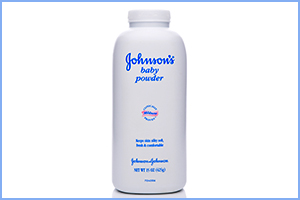Even as the company continues to defend the safety of its flagship product, pharmaceutical giant Johnson & Johnson announced on Tuesday that it would discontinue selling its talc-based baby powder product in the U.S. Facing tens of thousands of lawsuits from women alleging their ovarian cancer was caused by asbestos contamination of J&J baby powder, the company stated that the discontinuation of the product was the result of a reassessment of its consumer product portfolio spurred by the pandemic. According to J&J, demand for the product had been reduced in part because of a decline in consumer demand and the dissemination of misinformation about its safety. As a result, in March, the company had stopped shipping hundreds of items in both the US and Canada. This discontinuation follows the recall in October, 2019 of 33,000 bottles of baby powder that had tested positive for asbestos particles. At that time the company maintained that the recall had been done in “an abundance of caution” and continues to argue that the product is safe, noting that all adverse verdicts against the company have been reversed on appeal.
J&J is not removing the product from the shelves; retailers will be selling the talc products until the inventory run out and the product will continue to be sold in other countries. In addition, cornstarch-based baby powder manufactured by J&J will be available.
Internal documents produced during the course of recent litigation had revealed that J&J had been concerned about possible asbestos contamination in its talc products for decades even as they claimed that scientific studies had established the safety of its baby powder. Recent verdicts against the company include a 2018 finding by a St. Louis jury that J&J’s baby powder contributed to 22 women developing ovarian cancer; that verdict totaled $4.7 billion. It should be noted that there have also been a number of verdicts in the company’s favor.
In April, the U.S. District Judge Freda L. Wolfson presiding over the federal MDL ruled that most of the experts offered by the plaintiffs met the Daubert standard requiring testimony to have sufficient scientific support; this ruling paves the way for future trials.
At least half of J&J’s revenue comes not from household medicine products but from the development and marketing of pharmaceuticals; this has not come without its own issues, most notably J&J’s role in the marketing of prescription pain killers and contributing to the nation’s opioid epidemic.
Click on this link for information on Verus’ Mass Tort Services. To contact us, fill out this form or email us at info@verusllc.com and we will reply immediately.







